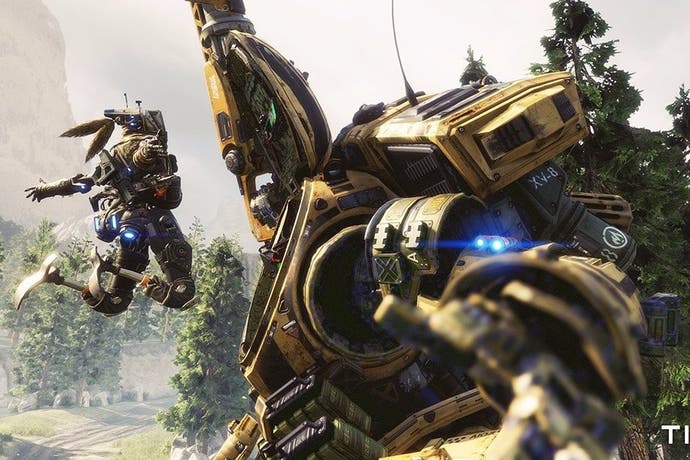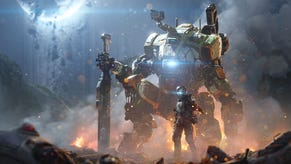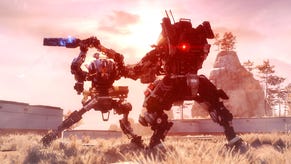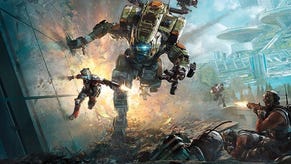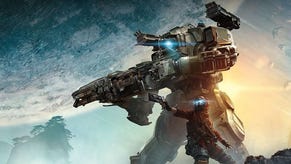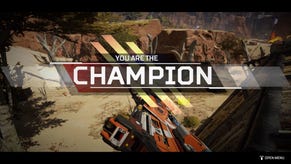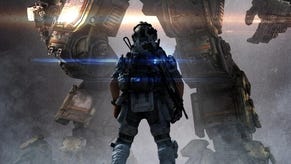Be advised: Titanfall 2's multiplayer runs much deeper than the original
Things to mech and do.
One of the oddest themes that recurred during discussions of 2014's ebullient robots-and-rangers shooter Titanfall, was that it would have been better had it rid itself of the titular Titans. Those who honed their skills on the battlefield of COD and, well, Battlefield, yearned for a mode where Pilots (Tianfall's player characters) could wage war without the building high metallic monstrosities getting in the way; a shooter that benefitted from the free-running, double jumping fluidity Titanfall had in abundance, but did away with half of its charm.
Eventually, Respawn Entertainment succumbed to the demand, and released a Pilots-only mode for Titanfall. And guess what? It was the worst mode in the game. What those rallying for simplicity failed to understand is that the Titans and AI-controlled grunts littering the battlefield weren't just irritating oddities getting in the way of the real action. They were crucial to the game's flow - a relentless assault on the senses, where searing pace, lethality, accuracy and movement blended seamlessly with thumpy, stompy, robot carnage.
Respawn somehow manages to build on that sumptuous flow in Titanfall 2, by introducing a slew of small but significant changes to multiplayer that refine and rework one of the slickest shooters around. Fears from the 'beta-by-another-name' Tech Test that the studio had fundamentally botched what made Titanfall great are instantly allayed during your first game of the returning Attrition mode. Pilots move with the same precision and grace as they did before, map design is smart, tight and intricately woven to encourage wall running and jumping, and the snap of the weapons, abilities and the mighty Titans is perhaps even more inviting than before.
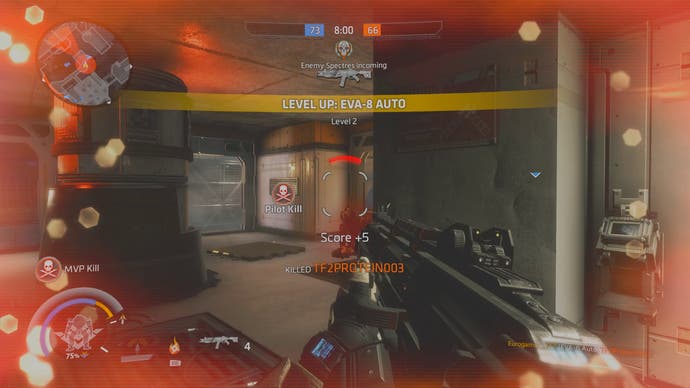
To an outsider, Titanfall 2 looks like the same game, and in truth it often feels like it. As a shotgun obsessive, I once again grabbed my trusty EVA-8 and ran riot during my first match (played on PC against a variety of Europe's press), combining its slightly unfair range with the new slide ability (yes, you couldn't actually slide in Titanfall, even though my memory tells me otherwise) to violent and deadly effect. Titans were called in, grunts were slaughtered, points were gained, and the enemy dropship was murdered before it could ever jump into hyperspace. Just as it should be.
Dig a little deeper, though, and things do start to look a little different. Titans see the biggest changes. Firstly, you no longer just have three models to work with - you can now choose from (pending unlocks) one of 6 named Titans, all of which have their own specific abilities. Ronin, an early favourite, is a melee Titan with a giant electric katana and the ability to teleport, meaning if you get in close you can lay waste to enemies, but get caught at mid range and you're in trouble. Scorch, as his name suggests, loves a bit of fire, and can barrier off rival Titans with a flame wall, and burn enemies to cinders with his flame core 'ultimate'.
These character-based Titan changes do mean that you lose some of the customisation options that made assembling your robot ally in the original so enjoyable, but there are still options to tinker with on each Titan, and the overall range is much larger. It's crucial, too, to be able to spot an enemy Titan on the map and know what type of encounter you're in for - a smart piece of design borrowed from class-based shooters like Overwatch.
Regardless of which Titan you pick, it's prudent to quickly get your large chrome-covered head around the new power system that deepens the relationship between Pilot and Titan on the field. Titans now deploy without shields, and all contain a large green battery in their heads. Blow up a Titan, and its battery will remain on the ground, so a Pilot can pick it up. Rodeo a friendly Titan, and you can whack a battery into its cranium, and power it up with a shield.
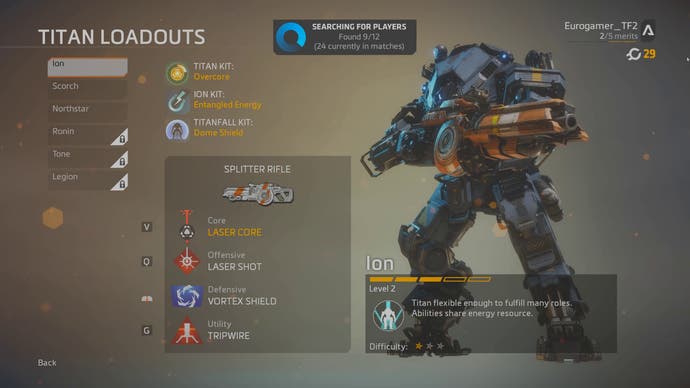
So, the smart thing to do is grab a battery as your Titan timer ticks down, then jump into your fresh robot with an automatic shield boost. Simple enough. Where it gets really clever, though, is when you start assisting your teammates by clambering aboard and boosting them with batteries, or jumping onto enemy Titans and whipping their batteries out.
It takes time to get used to, and was a risky move by Respawn; changing the entire ecosystem of its battlefield and maintaining the same flow is hugely challenging, but this is a team who has been setting the bar for this kind of stuff for a long time now (if we're including Modern Warfare in here, which we must).
More changes become apparent when you're sprinting about the map as a Pilot. Remember Burn Cards, Titanfall's innovative one-off spawn boosters? Well they're gone, somewhat controversially, now replaced with a boost power that can be activated upon good performance (functioning on a similar timer to your Titan).
It's likely a choice made in the favour of balance, as certain burn cards could be too powerful in changing the tide of a match, and it's good to have another tier of unlockables as you progress through the online ranks. However, during the second half of our multiplayer session, Respawn fired everyone up to a high rank and let us run free with guns, perks and boosts. One journalist, who was a skilled player anyway, immediately equipped the infamous Map Hack (the original's most valuable burn card), and ran up absurd score streaks as he consistently knew the location of all his opposition. I'm not bitter at all about it, as you can tell.
As with any multiplayer game, balance changes are inevitable and whether this ends up being an actual issue, or - like Bastion from Overwatch - just needs a period of adjustment and acclimatisation, we shall see in time. Respawn has proven its willingness to dig into its own game and change all manner of things, so expect Titanfall 2 to undergo a similar gradual improvement.
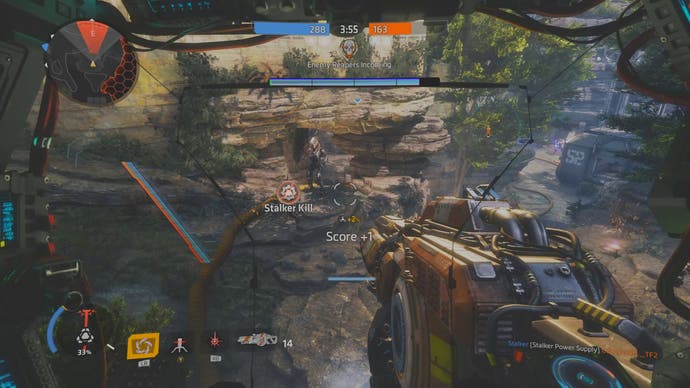
And in truth, gradual improvement is a pretty fine way to sum up what we have here. As a sequel to one of the truly great online shooters, Titanfall 2 makes clever changes to its formula without ever damaging it. This is still the thrilling, effervescent, moreish shooter it once was, with a touch more depth, a denser unlock path and a handful of new modes.
Bounty Hunt is the most divisive new mode here, borrowing some elements from MOBAs to create a match that has a very different pace to a typical round of Attrition. As those who participated in the Tech Test will know, teams battle to take out AI enemies (and each other) at designated points, awarded cash for doing so, then have the opportunity to bank that cash at a couple of drop zones in between rounds. It'll likely never replace Attrition as the truest form of Titanfall, but there's scope for dramatic comebacks, and as usual, dominance typically comes down to who can manage their Titan drops the best.
Perhaps the most interesting new mode here is Coliseum. There was barely time time to investigate during the multiplayer event, but this is a one-on-one game that you have to buy into using in-game currency (which is otherwise used to unlock new weapons and skins). The arena is completely open; a translucent dome where two combatants pepper each other with a plasma rocket launcher until one dies. At the moment it's a best-of-three match, and is surprisingly tense and enjoyable. We shall examine this one further when the final retail game appears.
Which can't come soon enough, really. Without reinventing the wheel (and this is the team that pretty much invented that wheel in the first place), Respawn has once again delivered a world-class multiplayer shooter defined by its flow of Pilot-to-Titan-back-to-Pilot. Barring some sort of server meltdown or a horrendous balancing oversight, this should comfortably be challenging the likes of Battlefield 1 and Infinite Warfare for the top multiplayer spots over the next 12 months.
Until release date, then, I'll be here, standing by.
